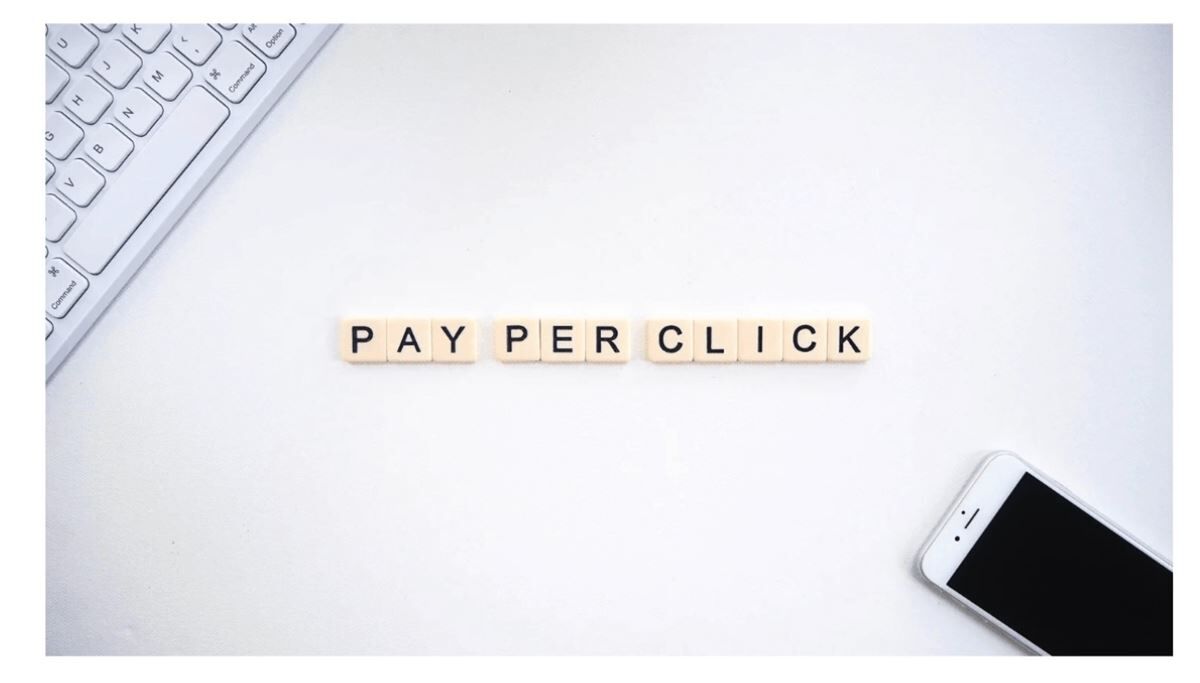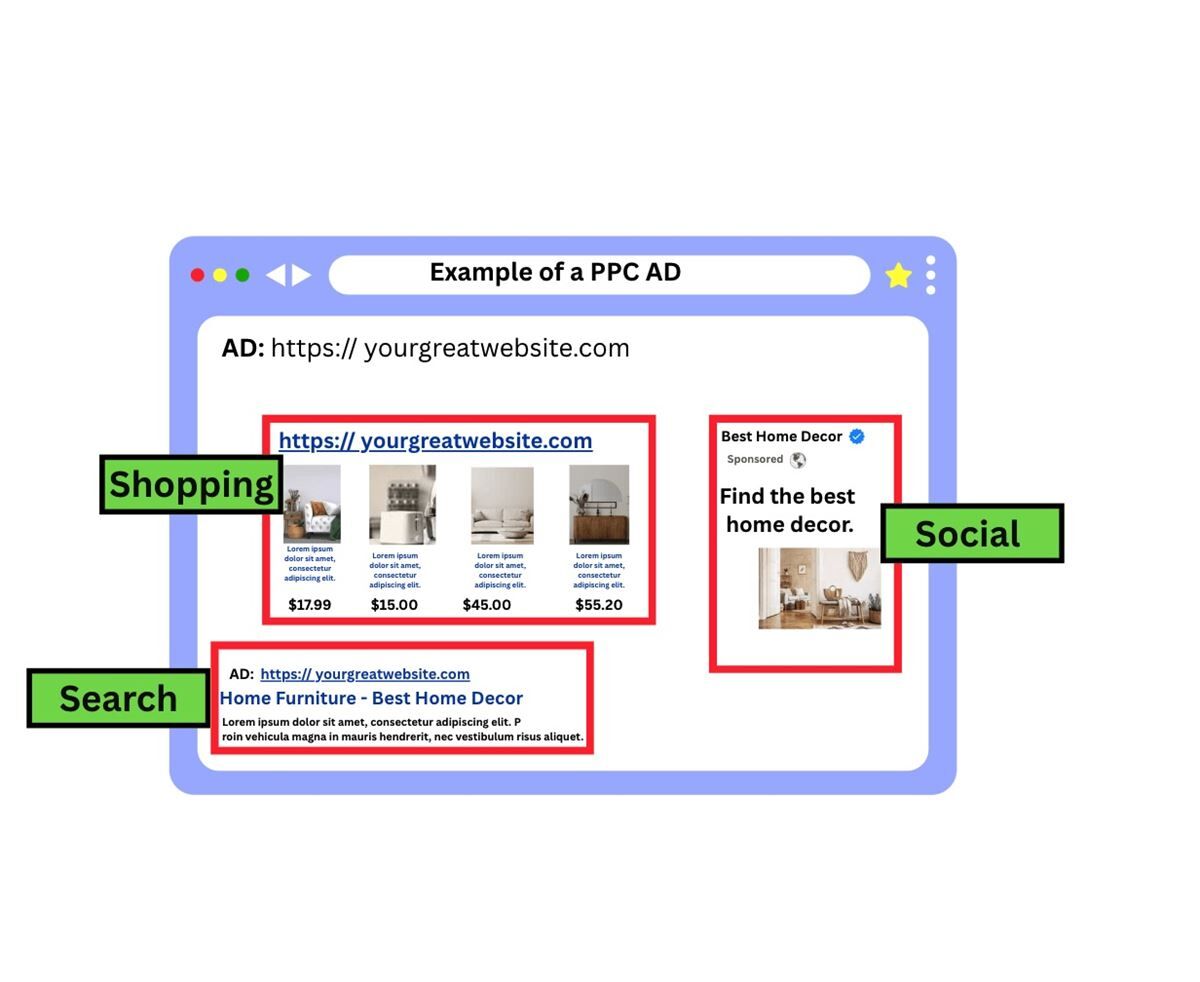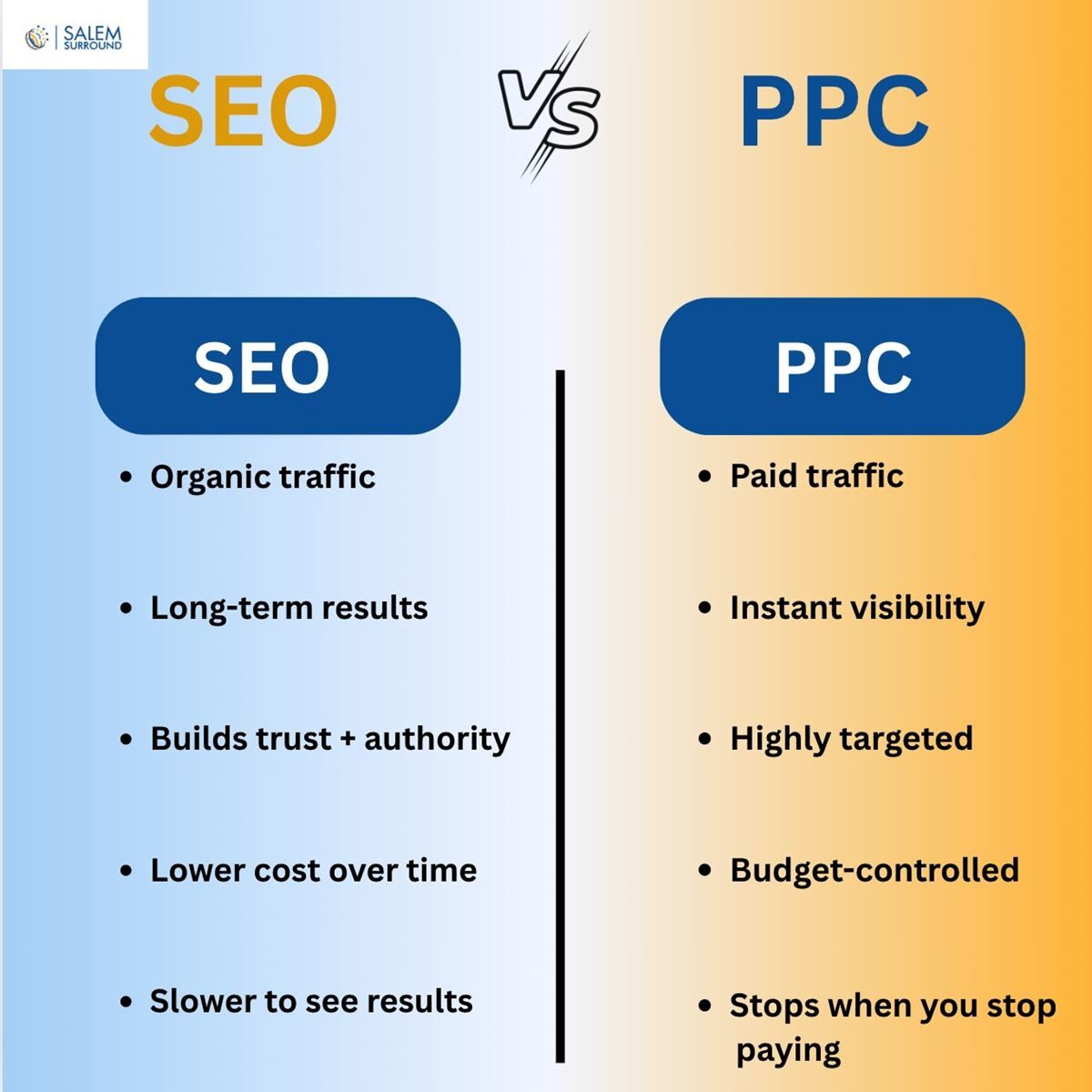PPC Success Guide: Real Strategies That Actually Drive Sales
Pay Per Click Advertising

Table of Contents
- What is PPC (Pay-Per-Click)? How does PPC advertising work?
- PPC vs SEO
- PPC for Small and Medium Businesses
- E-commerce PPC Management
- PPC for Lead Generation: How to get more leads
- What is Google Ads: How to do PPC with Google Ads
- Keyword Research for PPC
- PPC Digital Marketing Agency: How to get started with Salem Surround
What is PPC (Pay-Per-Click): How does PPC advertising work?
As a business owner you most likely already know what PPC advertising is, but just in case you don't here’s a guide to understanding it and how it can help you generate new leads. PPC stands for pay-per-click and is exactly what it sounds like, you only pay when someone clicks on your ad. It’s a powerful way to get real people to your site, landing page, or app. And when it’s done right? That click costs less than the value it brings in. PPC has an average of 200% return on investment (ROI). That’s smart marketing. For example, Say you spend $5 on a click and it leads to a $150 sale, that’s money well spent. That’s how smart PPC pays off.

PPC vs SEO: What Sets Them Apart?
SEO and PPC are not enemies, they’re the ultimate duo. Yes, they are different, but should be used together for the best digital marketing results. SEO brings in organic traffic to your website through many strategies such as, link building, on- page keyword optimizations, technical site audits, etc. SEO is a long term investment, whereas PPC is more great for short term goals and creates instant visibility through paid ads. The key differences between the two is time and cost.

PPC for Small and Medium Businesses
With consumer search behavior evolving and the digital landscape growing, it is more important now than ever to increase your digital presence. As a SMB (Small Medium Business), standing out in your industry is a must. There are many advantages of PPC, lets explore them
- You Don’t Need a Big Budget to Make a Big Impact
Think you need a six-figure ad spend to see results? Think again. PPC lets you start small, test, and scale up. Even with $10 a day, you can drive traffic and conversions. That’s power without the price tag. - Be Seen by the Right People, at the Right Time
Whether someone’s searching for “emergency plumbing near me” or “best custom cakes in town,” PPC puts your business front and center right when it matters. 3. You Only Pay When
They Click
That’s right, no wasted money here. You’re only charged when someone actually clicks on your ad. If they scroll past? No charge. It’s like only paying rent when a customer walks into your store.
- Target Like a Pro (Without Being One)
Want to show your ads only to people in your city? Done. Want to target busy moms on their phones after 8 PM? You got it. PPC targeting options are so sharp, it’s like using a digital magnifying glass on your ideal customer. - Instant Visibility While You Build SEO
SEO is awesome, but it takes time. PPC gives your business instant top-of-the-page visibility while your organic rankings catch up. It’s like a fast pass to the front of the line. - Track Every Click, Call, and Conversion
Unlike traditional ads, you’re not guessing what works. PPC gives you crystal-clear data: which ad led to a phone call, which keyword triggered a sale, what time of day gets the best results. It's marketing with receipts. - You’re in the Driver’s Seat
Pause campaigns, test new offers, change your budget, you’re always in control. Need to run a weekend flash sale? Done in minutes. Want to pause your ads while you're on vacation? Easy. - You Can Outshine the Big Guys
PPC isn’t about who’s the biggest, it’s about who’s the smartest. With sharp targeting, compelling copy, and strategic bidding, you can outshine competitors that have 10x your budget. - Turn Window Shoppers into Buyers with Retargeting
Ever browsed a website and then seen their ad follow you around? That’s retargeting, and it works. PPC lets you gently remind visitors who didn’t convert that your product or service is still here (and still awesome). - It Works While You Sleep
You could be watching Netflix, on a Zoom call, or catching some much-needed sleep, and PPC keeps working. Ads keep running, clicks keep coming, and leads keep rolling in.
Ecommerce PPC Management
Ecommerce PPC is pretty straight forward and a great strategy for ecommerce businesses. Running a PPC campaign can increase your businesses revenue, and help you get the most out of your marketing budget. With the right strategy, PPC puts your products right in front of people who are ready to buy, no guessing, just results. Whether you're using Google Shopping Ads, Meta Ads, or even Amazon PPC, these platforms allow you to show off your product, price, and even reviews directly in the search results.
And here’s the real win, you can track exactly which ad, keyword, or product listing led to a sale. That means no more throwing money at strategies you can’t measure. Plus, with dynamic remarketing, you can re-engage shoppers who visited your site but didn’t check out, giving them a second (or third) chance to fall in love with your product.
Want to push your bestsellers? Launch a seasonal promo? Clear inventory fast? PPC gives you the flexibility to adapt quickly and keep the cash flowing. It’s not just about clicks, it’s about conversions. And with a dialed-in ecommerce PPC campaign, every dollar you spend is an investment in real, trackable growth.
PPC for Lead Generation: How to get more leads
If you're running a small or mid-sized business, you don’t have the luxury of tossing money into a marketing black hole. You need results: fast, trackable, and scalable. That’s where PPC (pay-per-click) comes in. It’s not just about getting clicks; it’s about turning those clicks into actual leads. You know, the people who are genuinely interested in your service, not just random window shoppers.
Let’s break down how to make PPC work for you and not just drain your ad budget.
Start with the Right Keywords
This isn’t about casting the widest net. It’s about fishing in the right pond with the right bait. Focus on long-tail keywords that signal intent. For example, “affordable accounting services for startups” will bring in better leads than just “accountant.”
According to WordStream, 50% of search queries are four words or longer, and they tend to convert better. So forget about broad, expensive terms. Think like your customer. What would they type in when they’re ready to buy or contact you?
Landing Pages That Don’t Suck
Here’s a common PPC mistake: sending traffic to your homepage. Please don’t. If someone searches for “emergency plumbing in Phoenix” and lands on a generic homepage with no phone number above the fold, they’re gone.
Create dedicated landing pages tailored to each ad group. Make sure they load fast, are mobile-friendly, and have one clear CTA (call to action). According to Unbounce, landing pages with a single CTA convert 202% better than those with multiple competing messages.
Use Lead Magnets Strategically
Not everyone’s ready to buy right away. But that doesn’t mean they’re not worth capturing. Offering something valuable, like a free guide, checklist, or demo—in exchange for their email keeps you in the game. Use PPC to drive traffic to these offers, and let your email funnel do the nurturing.
This way, even if they don’t convert today, they’re still in your ecosystem.
Track. Test. Tweak. Repeat.
You don’t need a six-figure budget to make PPC work. You need smart tracking. Use Google Ads’ conversion tracking and link it with Google Analytics. Find out which keywords, ads, and landing pages are actually bringing in leads. Kill what’s not working and double down on what is.
Pro tip: Even tiny A/B tests on your ad copy or button colors can lead to serious improvement. One study by HubSpot showed that A/B testing landing pages can boost conversions by up to 300%.
Retargeting: Because Not Everyone Converts on the First Try
People get distracted. Retargeting gives you a second shot. With a pixel on your site, you can show ads to people who visited your page but didn’t convert. It keeps you top of mind and increases the chances they’ll come back and fill out that form or make that call.
Bottom line: PPC isn’t just for big brands with deep pockets. Done right, it’s one of the most powerful lead-gen tools SMBs can use. Focus on intent, optimize ruthlessly, and remember—it’s not about more clicks, it’s about the right clicks.
Need help getting started? Let’s chat. We’re here to make your ad dollars work harder and smarter.
What is Google Ads: How to do PPC with Google Ads
If you want to grow your business and reach more customers Google Ads might just be your new best friend. It’s the biggest pay-per-click (PPC) advertising platform in the world and it works because it puts your business exactly where your potential customers are already looking.
Let’s break it down. Google Ads is a platform that lets you place ads across Google Search, YouTube, Google Maps, Gmail, and millions of websites in the Display Network.
How Google Ads Works
Google Ads operates on a bidding system. You choose keywords you think your audience will search for and then set a maximum amount you're willing to pay per click. When someone searches for that keyword, Google runs an auction. Your ad’s position depends on a mix of your bid, the relevance of your ad, the quality of your landing page, and expected performance.
This means a smaller business with a smart strategy can still outrank a bigger competitor with a bigger budget. It’s not just about throwing money at it. It’s about relevance and strategy.
Campaign Types You Can Run
There are several types of campaigns available on Google Ads, but for most businesses starting out, these are the big three:
Search Campaigns
These are the classic text ads that show up at the top of Google search results. Perfect for capturing people who are actively searching for your product or service.
Display Campaigns
These are visual banner ads that appear across the web on sites in Google’s Display Network. They’re great for brand awareness and retargeting people who have already visited your website.
Video Campaigns (YouTube)
These ads run before or during YouTube videos. If your target audience spends time on YouTube, this is a smart place to grab their attention.
Keyword Research for PPC

Keyword research is figuring out which words or phrases people type into Google when they’re looking for something you offer. In PPC, these words trigger your ads.
If you pick the wrong keywords, your ad might show up for people who aren’t interested. If you pick the right ones, you’ll get clicks from people who are more likely to buy, sign up, or take whatever action you want.
Step 2: Make a List of Obvious Keywords
Start by writing down what you sell or offer. Keep it simple.
Say you do real estate. Your basic list might include:
- homes for sale near me
- buy a house in [your city]
- real estate agents in [your city]
- condos for sale
- first-time home buyer help
These are your starting terms, also called “seed keywords.”
Step 3: Use Tools to Find More Keywords
Next, use keyword tools to grow your list and see useful info like how often people search those terms and how competitive they are. Some good tools are:
- Google Keyword Planner (free with a Google Ads account)
- Ubersuggest (easy to use)
- AnswerThePublic (great for finding questions people ask)
These tools can help you find keyword ideas and see what people are really searching for.
Step 4: Group Keywords by Theme
Once you’ve got a list, group similar ones together. For example, put all “travel backpack” related terms in one group.
This helps you write better ads that match what people are searching for. It also makes Google happy, which can lower your costs.
Step 5: Add Negative Keywords
Negative keywords are words you don’t want your ads to show up for.
If you sell high-end backpacks, you might want to block words like “cheap” or “free.” That way, your ad won’t show to people who aren’t your target customer.
PPC Digital Marketing Agency: How to Get Started with Salem Surround
Now that you’ve got a solid understanding of PPC and how it works, let’s talk about what comes next, putting it into action.
That’s where Salem Surround steps in.
We’re not just here to run ads. We’re here to drive real results. Whether you want more phone calls, online purchases, appointment bookings, or form submissions, we build a paid strategy that aligns with your goals and helps you reach the people who matter most.
Our team brings serious PPC experience and a people-first mindset. We take the time to understand your business, research your market, and create campaigns that bring in high-intent clicks and measurable returns.
What You Get with Salem Surround:
- Strategic Planning
We look at what makes your audience tick and craft campaigns that speak directly to them - Full-Funnel Optimization
From ad copy to landing page to conversion tracking, we handle every step so your PPC doesn’t just perform—it thrives - Local Targeting Expertise
Want to stand out in your city or neighborhood? We’ll make sure your ads reach the right folks in your area - Clear, Actionable Reporting
You’ll always know what’s working and where there’s room to grow with reporting that actually makes sense - Results That Matter
Our focus is on leads, sales, and visibility. We’re here to help you grow in a way that feels real and sustainable
Whether you're just getting started or looking to level up your current strategy, Salem Surround is your PPC partner for progress. Let’s make those clicks work harder for your business!

